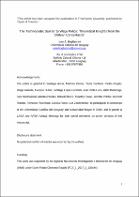JavaScript is disabled for your browser. Some features of this site may not work without it.
The technocratic barrier to wage policy: theoretical insights from the Chilean Concertación
Resumen
During the Latin American left turn, most governments rapidly understood the importance of committing to macroeconomic equilibriums, successfully managing to combine this goal with a wide array of social policies. Wage policy proved to be a conflictive arena coming from a period of harsh austerity measures. This article provides unique insights, from the Chilean Concertación governments (1990-2010) about the importance intra-left conflicts had in the advancement of labor collective rights. The working hypothesis is that the conflict between party leaders and technocrats alongside a perceived trade-off between growth and distribution is a prime factor for understanding wage reform outcomes. The analysis relies on a mixed-methods approach combining regression analysis and process-tracing. Chile’s labor reform attempts during the Concertación governments, with feeble societal linkages, provides relevant theoretical insights for the understanding of how the abovementioned perceived trade-off may have played in other cases, not only in Latin America but also in other regions of the developing world. The analysis is novel in bringing intra-left conflict back in as an important driver for labor relations reforms and improves our understanding of the political economy of intra-left conflicts during the post-neoliberal period.
Colecciones
- Artículos [51]


